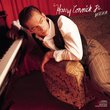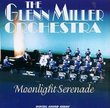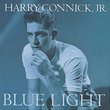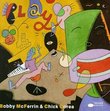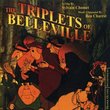| All Artists: Thomas Schippers, Rome Opera House Chorus & Orchestra, Franco Corelli, Gabriella Tucci, Giulietta Simionato, Robert Merrill Title: Verdi: Il Trovatore (Highlights) Members Wishing: 0 Total Copies: 0 Label: Classics for Pleasure Original Release Date: 1/1/2007 Re-Release Date: 11/20/2007 Genre: Classical Styles: Opera & Classical Vocal, Symphonies Number of Discs: 1 SwapaCD Credits: 1 UPC: 094639337521 |
Search - Thomas Schippers, Rome Opera House Chorus & Orchestra, Franco Corelli :: Verdi: Il Trovatore (Highlights)
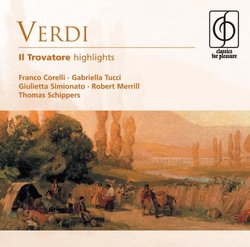 | Thomas Schippers, Rome Opera House Chorus & Orchestra, Franco Corelli Verdi: Il Trovatore (Highlights) Genre: Classical
|
Larger Image |
CD DetailsSimilarly Requested CDs
|
CD ReviewsAn old favorite Ralph Moore | Bishop's Stortford, UK | 08/23/2008 (4 out of 5 stars) "(This review applies to the complete set now re-issued on HMV Classics "twofers".)
For years I had contented myself with listening to most people's automatic recommendations for a recorded "Trovatore": the Mehta set with Price, Domingo, Cossotto and Milnes all in their youthful prime; the old Cellini with Bjorling a nonpareil of a heroic Manrico (at least on record, if not so much on stage), Barbieri a tower of strength as Azucena and Warren the most sensitive di Luna on disc - but a rather quavery (to my ears) Leonora from Milanov; and, finally, the Karajan/Callas set, which is self-recommending despite Di Stefano's battle with Manrico and a sensitive if rather under-powered Panerai as di Luna. Then I started to look at other sets and discovered that there were many more of similar stature; not least the Giulini, then the old Serafin (see my review), often oddly passed over, and now this 1965 recording in which the energetic Schippers (sadly cut down by lung cancer at 47) takes the old warhorse for another gallop round the paddock. (Hors concours, as a live recording, is Karajan's spectacular 1962 Salzburg performance with Price, Corelli, Bastianini and Simionato in younger, fresher voice than we find her in the Schippers - all galvanised by Karajan's dynamism and the buzz of performing live.) It seems to me that the most common flaw in any "Trovatore" recording is in the role of Leonora - certainly that is where I have reservations in the Serafin, Cellini and later Karajan sets - and this one is no different. Tucci is perhaps no-one's ideal Leonora, but I find myself re-assessing her standing in the light of her magnificent Desdemona in the live del Monaco/Gobbi Tokyo recording of "Otello" (see my review) and she is much more than competent here. Hers is not the most sumptuous sound and there is sometimes some shrillness up top, but she negotiates the coloratura very effectively and breathes life into the character. She certainly isn't over-shadowed by her co-singers - and what a company they are. Simionato was slightly past her best - this was her last commercial recording and there is some bleakness and "drop-out" around middle E, F, and G but the ringing top notes and booming lower register are very effective and she brings all her vast stage experience to embodying this tormented character. A little wear and stress is not inappropriate to a woman who has been tormented by guilt and rage for twenty years; there is no more believable Azucena on record, Cossotto and Barbieri notwithstanding. Corelli is a phenomenon; his very first notes bring a thrill of recognition and his Troubador ends that opening offstage aria with a ringing B flat. His fans will need no more urging; this is vintage Corelli. Mazzoli is a lighter voiced Ferrando than usual but very expressive and attentive to words - still, he's no match for Vinco or Moscona. Merrill is his usual smooth, robust, expressive self, effortlessly deploying one of the most beautiful baritone voices ever, even if he is less sensitive and nuanced than Warren - who is the only di Luna I know who actually sings "Il balen" like the love-song it is rather than a good baritone bawl. Schippers is at times hard-driven but also relaxes when his singers need time to make their points - and, unlike Serafin, he gets the tempo right for the martial opening of Act 3. So, this set finds an honourable place on my shelves alongside the other fine recordings mentioned above. Perhaps from a perspective of over forty years later we are beginning to realise how lucky we are to have good quality recordings of artists with the kind of Verdi voice which seems to have all but disappeared." |

 Track Listings (12) - Disc #1
Track Listings (12) - Disc #1